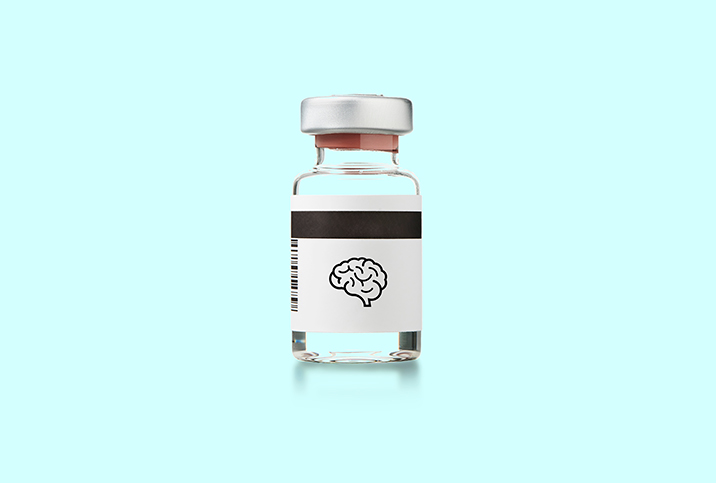Alzheimer's Disease: Risks, Myths and When You Should Seek Help

Considering how much you see and hear about Alzheimer's disease, it makes sense to wonder if it's a natural part of aging. The progressive disease that wreaks irreparable harm on sufferers' memories isn't a guarantee for everyone, but if your loved ones are diagnosed with Alzheimer's, you may speculate you're at risk, too.
Alzheimer's can also cause sexual health risks as the disease can affect a person's sex drive. It most often lessens libido, but in some cases, sufferers show more interest in sex. When this interest is excessive or obsessive, it's called hypersexuality. These behaviors are not always sexual in nature, however, but more about a lack of comfort or feeling pain, confusion or loneliness.
Alzheimer's disease is the most common type of dementia. Alzheimer's progressive symptoms can be debilitating. It's heartbreaking for family members to watch loved ones suffer while also worrying if they may soon start exhibiting similar symptoms.
But what are the real risks of Alzheimer's and what are myths?
The myths and misconceptions of Alzheimer's
Here, we'll address some commonly held misconceptions, causes and risks, while sharing expert insights and recommendations by a neurologist who specializes in treating Alzheimer's disease.
Myth 1: Alzheimer's is part of the aging process
"The biggest misconception about Alzheimer's is that it's a normal part of aging," said Nicole Purcell, D.O., M.S., a neurologist based in Harrisburg, Pennsylvania, and the senior director of clinical practice at the Alzheimer's Association.
"Alzheimer's is not normal aging," Purcell said. "It's a fatal and progressive disease that attacks the brain, killing nerve cells and tissue, affecting an individual's ability to remember, think, plan and, ultimately, function."
Myth 2: Alzheimer's affects only older people
According to the Alzheimer's Association, more than 6 million Americans of all ages are living with the disease. Although the majority are ages 65 and older, there is a minority of younger people in their 40s and 50s with early-onset Alzheimer's, and they may be in any stage of dementia: early stage, middle stage or late stage.
Myth 3: Alzheimer's is not fatal
Alzheimer's is commonly believed to be a nonfatal disease. This is not true. It is actually the sixth-leading cause of death in the United States. The number of Alzheimer's deaths has increased, in part, because of a growing population of older adults.
Myth 4: Alzheimer's can be cured
There is currently no treatment that can cure Alzheimer's disease.
Aducanumab, a therapy approved in 2021 by the Food and Drug Administration (FDA), changes the underlying biology of Alzheimer's disease, hence, potentially slowing cognitive and functional decline.
Another recent development is an even newer drug called lecanemab. In clinical trials, it was found to slow cognitive decline in people with Alzheimer's. On Jan. 6, the FDA announced accelerated approval of the drug for treatment of Alzheimer's.
Another myth surrounding Alzheimer's disease is the misbelief that flu shots, silver dental fillings, and drinking or eating out of aluminum cans, pots and pans can increase the risk of Alzheimer's. There is no scientific evidence to support these claims.
The best advice is to always check your sources of information and ask yourself, "Are these claims backed by reputable research, facts and figures?" If you're not sure, it's a good policy to verify any information you find with your local trusted physician.
Risks and causes of Alzheimer's disease
Alzheimer's often develops as a result of multiple factors rather than a single cause. These factors include family history, genetics, environment, lifestyle and head injuries.
Family history and genetics
Your risk of getting Alzheimer's disease is generally higher if a first-degree family member has the disease. But this does not necessarily mean you will develop Alzheimer's, Purcell said.
"There are multiple factors that contribute to Alzheimer's risk, and when diseases run in families, both genetic and nongenetic factors, including lifestyle habits and environmental factors, can play a role," she explained.
"Only about 2 percent of people with Alzheimer's have a genetically inherited form of the disease called 'familial Alzheimer's disease,' which makes having Alzheimer's a certainty," Purcell added.
Lifestyle
Poor sleep patterns (such as difficulty falling asleep and/or staying asleep), high alcohol consumption, smoking (or exposure to secondhand smoke) and lack of exercise can lead to an increased risk of Alzheimer's.
Similar risk factors associated with heart disease, such as high cholesterol, high blood pressure and obesity, may also increase your risk.
Age
Age is one of the commonly known risk factors for Alzheimer's. Although aging increases risk, it is not a direct cause of Alzheimer's.
Head trauma
Studies have found that traumatic brain injury (TBI) in people ages 50 and older tends to increase their risk of dementia and Alzheimer's disease. People with severe cases or multiple TBIs tend to be at a higher risk.
Other factors that can increase a person's risk of developing Alzheimer's include Down syndrome, mild cognitive impairment, untreated depression and social isolation.
Alzheimer's disease vs. dementia
While dementia is a general term, Alzheimer's disease is a specific brain disease.
Dementia generally refers to an impaired ability to remember, think or make decisions, and this impairment is often severe enough to interfere with everyday activities. Dementia is caused by damage to the patient's brain cells.
Alzheimer's disease is the most common type of dementia, accounting for 60 percent to 80 percent of all dementia. But it's informative to get to know other types of dementia:
Creutzfeldt-Jakob disease (CJD): This is a rapidly progressive, fatal neurodegenerative disorder that occurs when the prion protein—found throughout the body but whose function is not yet known—starts folding into an abnormal shape, ultimately destroying brain cells. Symptoms include depression, mood swings, difficulty walking, muscle stiffness, problems with memory, thinking, judgment and more. Although this is a rare disease found in 1 in 1 million people annually worldwide, it usually leads to death within a year of infection.
Frontotemporal dementia (FTD): This is a type of dementia that causes behavioral and language problems, as well as motor problems. It is a group of brain disorders caused by progressive nerve cell loss in the brain's frontal lobes or temporal lobes.
Huntington's disease: This is a rare, inherited, progressive brain disorder that causes a degeneration of nerve cells in the brain and usually results in death after a period of up to 20 years. Symptoms include:
- Movement disorders such as involuntary jerking, muscle problems, slow or unusual eye movements, and speech difficulties.
- Cognitive disorders such as difficulty focusing on tasks, lack of awareness of own behaviors, slowness in processing thoughts, lack of impulse control and difficulty in learning new information.
- Psychiatric disorders such as feelings of irritability, insomnia, fatigue and frequent thoughts of death.
Symptoms often first appear when people are in their 30s or 40s.
Lewy body dementia (LBD): This is a type of progressive dementia caused by abnormal deposits—called Lewy bodies—of the alpha-synuclein protein in the brain. These deposits affect chemicals in the brain, which causes problems with thinking, movement, behavior and mood. Symptoms also include sudden changes in alertness, hallucinations, tremors and rigidity.
Mixed dementia: This occurs when the brain is affected by more than one cause of dementia simultaneously. The most common form of mixed dementia is a combination of Alzheimer's disease and vascular dementia.
Parkinson's disease dementia: A progressive neurological disorder that damages the central nervous system, Parkinson's causes the tightening of muscles, resulting in tremors and difficulty walking or performing other daily tasks. People with Parkinson's disease may start to develop cognitive problems such as dementia, also known as Parkinson's disease dementia. This condition mainly affects adults older than 65. Studies indicate that at least 75 percent of patients who have been living with Parkinson's for at least 10 years develop dementia.
Vascular dementia: This condition involves a decline in memory, thinking and behavior caused by the deprivation of oxygen and nutrients to the brain, usually due to decreased blood flow to the brain. This condition can happen after a stroke. The symptoms of vascular dementia can also be similar to those of Alzheimer's.
When should you start seeking help?
Purcell advised that any individual who has concerns about their memory and ability to think clearly should seek professional help immediately to get a medical evaluation of their condition. She recommended approaching your primary care physician as a start.
"Your primary care doctor will evaluate your overall health and identify any other conditions that could be affecting your cognition," she explained.
This is definitely a good start as some causes of cognitive decline are treatable, she added. These causes include depression, sleep problems, side effects from medication and certain vitamin deficiencies.
Your doctor then might perform a brief cognitive assessment.
"These assessments can take many forms, including asking you about cognitive concerns, directly observing your interactions, seeking input from family and friends, or using short verbal or written tests that can be administered easily in your physician's office," Purcell continued.
Although these assessments may not provide a definite diagnosis, they are an important step to take if you are beginning to experience cognitive problems.
"They are a first step to determine if problems exist," she explained. "If cognitive decline is detected, your physician may order advanced testing or refer you to a specialist for a more definitive diagnosis."


















